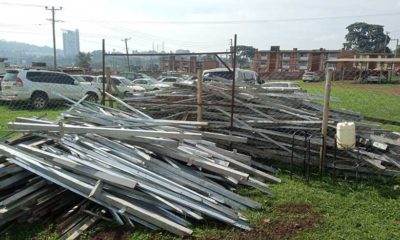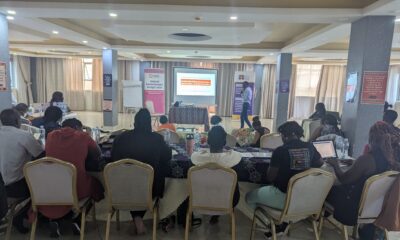News Feature
The price of stealing power
SERIES:Part one

A resident showing how they steal power
Abubaker Hiire in 2014 established a grocery at their home in Aisa-Teko village, Namanyonyi Sub County, Mbale district, with capital of UGX 500,000. By 2016, the grocery had expanded into a shop worth UGX 7m.
Using illegally connected electricity, he watched TV, pressed clothes and offered commercial electrical services such as charging phones and laptops.
Income from the shop would sustain his family and cover school fees for his two brothers, Musa Were who was in Primary Four at Nankusi Primary School and Ramathan Yekoniya who was in Senior one at Nakaloke Secondary School.
His business was ended in one dreadful night in April 2016 when UMEME and the Uganda Police Force (UPF) raided his shop during an operation on illegal power connections in the Sub County.
“I had placed UGX 5m on the table meant for buying commodities for the shop. When I saw them, I ran away and left the money. Returning after some few hours, I did not find the money,” he said. “They also took ten mobile phones for my customers worth UGX 450,000. They broke my television set, DVD player and woofer.”

Hiire’s mother Safina Namwabira and Father sits infront of the formerr shop of their son
The operation caused misery to the family because the sole provider remained jobless.
“We now struggle to take care of him, his wife and his brothers. Our son who used to take care of us now mostly depends on us,” Safina Namwabira, Hiire’s mother said.
Hiire has part time in brick laying and as a turn-man on trucks.

Hiire’s house which he was constructing before UMEME raided him
“I had started constructing my house (four rooms) but since that night my house has not exceeded the wall plate level,” he told me, showing me the structure battered by rains.
Local leaders told me that Hiire was one of the over 100 people in the sub county affected annually because of illegal power connection and vandalism between 2016 and 2018.
Isma Mwidu, the Vice-Chairperson of Bumasira-Namakole village said that, in his village alone, over 30 people were in April 2018 brutally arrested and lost their property in power theft operations.
“Property worth over UGX 2m including television sets, phones, chargers and woofers were confiscated when UMEME and police raided this village,” he said
He added that: “In addition to the lost properties, the suspects were presented before Mbale High Court and had to pay fines before they could be released.”
Suzan Nambozo, a resident of Mataale cell, Bumudu Parish, Buwalaasi sub county in Sironko district also tested the wrath of the illegal power connection when UMEME and Police carried out the operation in that region in 2018
“They flogged all of us in the house including my six children. They arrested me and took me and other four women to Sironko Police Station where we paid UGX 2m before being released,” she said.
Power theft and vandalism has negatively affected residents in rural areas in Bugisu sub region. Many people in the districts of Mbale, Sironko, Manafwa, Namisindwa, Bulambuli and Bududa have lost lives and properties.
According to UMEME, over 200 people were by 2017dying annually in Bugisu sub region due to illegal power connections.
How the vice spreads in villages
On December 17, 2019, I arrived in Mbale district at about 5:00pm to a cool, smooth environment from the green plantations on either side of the Mbale-Palisa Road.

Mbale-town-at-night-after-installation-of-street-lights. phot by David Mafabi
Mbale town is beautiful and bright during evening hours. The restoration of street lights by the Mbale Municipal Council in partnership with Uganda Support to Municipal Infrastructure Development (USMID) program has given the town a marvelous look.
My guide, identified as Tom took me on a tour through Republic Street and the Mbale-Soroti highway. All houses were lit up, some certainly through illegal connections.
At around 8:00pm we were going through Namakwekwe and Nkoma trading centres, on the outskirts of Mbale town. Via Gangama Road, we proceeded to villages of Bujoloto and Gangama in Nkoma ward, Namanyonyi Sub County, and later Kiteso and Mission cells in Namakwekwe ward.

Students of IUIU cleaning Soroti road market in Namakwekwe Trading Centre in February 2018
As we slowly rode away from the trading centres, I began to see houses which were lit but neither had clear grid connections nor solar panels.
Tom had a friend in Bujoloto village, a local electrician (name withheld) who illegally connects people to the grid for a fee. The electrician showed me tiny wires that had been hooked on the transmission lines.
We escorted the electrician to the well to fetch water. On our way there, he showed me very tiny wires connected to over 20 houses. You cannot see them even during day time if you are very keen enough. Even houses that have legal connects also had those wires.
“What most of them do is to go to UMEME and secure legal connections which they use during day time. At night and during weekends they turn to their illegal connections to avoid paying for the electricity they use during that time,” he told me

Mbale town
In Bumboi and Luki villages of Bumboi parish, Bungokho Sub County in Mbale districts, the situation was similar.
I visited villages in Namanyonyi and Buwalaasi Sub Counties (Mbale and Sironko districts) the following day.
Busamira-Namakole zone was not yet connected to power. Neither the Uganda Electricity Transmission Company (UETCL) nor the Rural Electricity Agency (REA) had extended transmission lines to the area, but, interestingly, they had victims of power theft.
A resident who preferred anonymity told me that they had requested to be legally connected to the grid for several years but in vain, which forced them to just steal it.
“Since the transmission had stopped in Busamira upper zone, we dug underground from there up to here and everyone connected from underground,” she said.
She added that after the arrest of over 30 people in April 2018, they disconnected themselves.
In the villages of Busamira upper, Namabwa, Masanda, Namakole and Nankusi in Mbale district and Mataale cell in Sironko district, I, in broad day light.
Tom said that residents in these villages silently burry people who are electrocuted.
“They don’t want any outsider to know that they have lost a person. You just hear rumors,” he said.
The process of power theft
The anonymous local electrician said that most of the people use tiny wires which are hooked on to transmission lines.
“Those who are legally connected have two wires. What they always do is to disconnect the black wire that brings power from the pole in the main switch and replace it with the hooked one at night and reconnect in the morning,” he said.

Residents hook on such power lines
The 2018 UMEME report indicates that energy loss had reduced to 16.6 percent in 2018 compared to 17.2 percent in 2017 and 26.2 percent in 2012, indicating a reduction of 9.5 percent in the last eight years.
Though the report indicates a reduction in power theft, the June 2018 Budget Monitoring and Accountability Unit (BMAU) Briefing Paper indicates that energy loss due to power theft, poor billing and non-collection from the government was still high.
The paper indicates that rampant power thefts in Eastern Uganda has made the operations of UMEME very costly in the districts of Mbale, Bududa, Manafwa and Sironko.
Media reports indicate that UMEME loses UGX100bn due to power thefts annually, with UGX10bn lost in Mbale alone by 2017
UMEME, in collaboration with the police, launched the Fagiya operation early 2017 with the aim of reducing power theft.
However, residents who spoke to me on condition of anonymity alleged that UMEME and Police officials always extort money from them when carrying out these operations.
Mbiro Swaibu the Defense Secretary of Namagumba Village, Namagumba Parish in Namanyonyi Sub County confirmed these allegations and said that all this is because the power distributors conduct operations at night, without the consent of the local authorities.
“The cause is good but the way it is conducted makes it unlawful and illegal. They come and do things without even notifying us. They arrest our people and these claims have been reported here,” he said.
He added: “I therefore call upon all responsible people including UMEME and Police to involve us in these operations so that they don’t appear like thieves. Imagine one day if the community turns against them who will help them? They can be called thieves and you can’t blame the residents”

John Robert Tukei the Elgon-region-Police-spokesman
John Robert Tukei the Elgon region Police spokesperson asked residents to always report these cases to the relevant authorities if they want to receive justice.
“This is an allegation I have also personally sensitized the communities about. I told them what to do when the police mistreat them. Until when we get a report on it, it remains an allegation” he said
He added that, “Let them always lodge their complaints to the Residence District Commissioner (RDC), LC5 chairperson, District Police Commander (DPC), Regional Police Commander (RPC), Police Standard Unit (PSU) and even myself on my contact 0752405570”
My efforts to get UMEME’s comment on that issue were futile. The UMEME Mbale regional manager referred me to the Media Relations Officer in Kampala, Stephen Ilungole.
“Right now I am too busy to speak to the media on any issue contact our Media relation officer at Rwenzori House in Kampala,” the manager told me.
I contacted Ilungole but for over two weeks, his response was that he was still gathering information.
“The Mbale team has requested that they share the information on Monday next week” he said in a WhatsApp message December 30, December 2019.
“Please give the team time to compile the information. They only reported to work today and I am in touch with them,” he said in another WhatsApp message on January 6, 2020.
In part two, we shall detail how the incompetence of REA and UMEME is aiding power theft in rural areas
This article was supported with funding from the African Centre for Media Excellence (ACME)
Comments


























